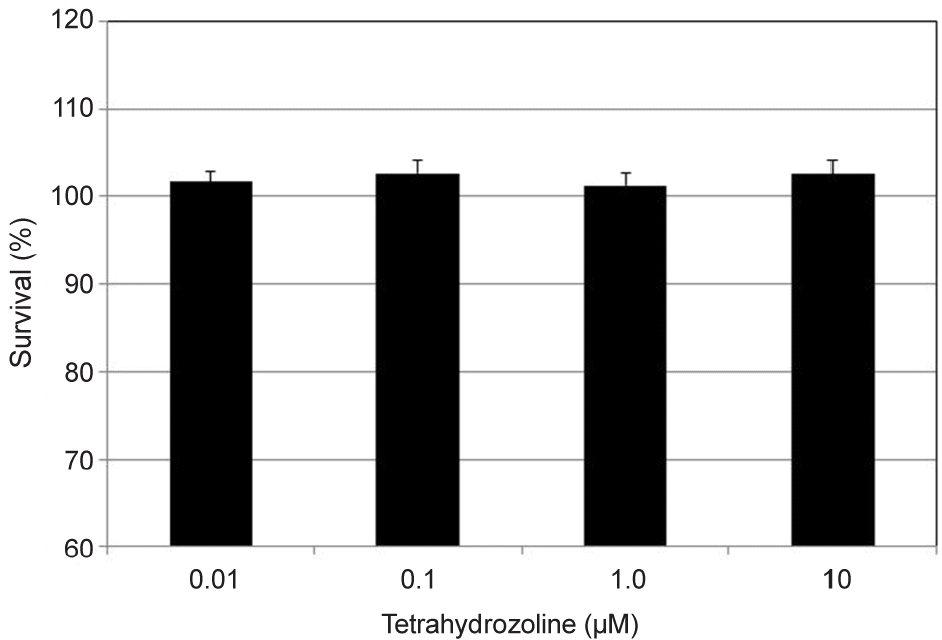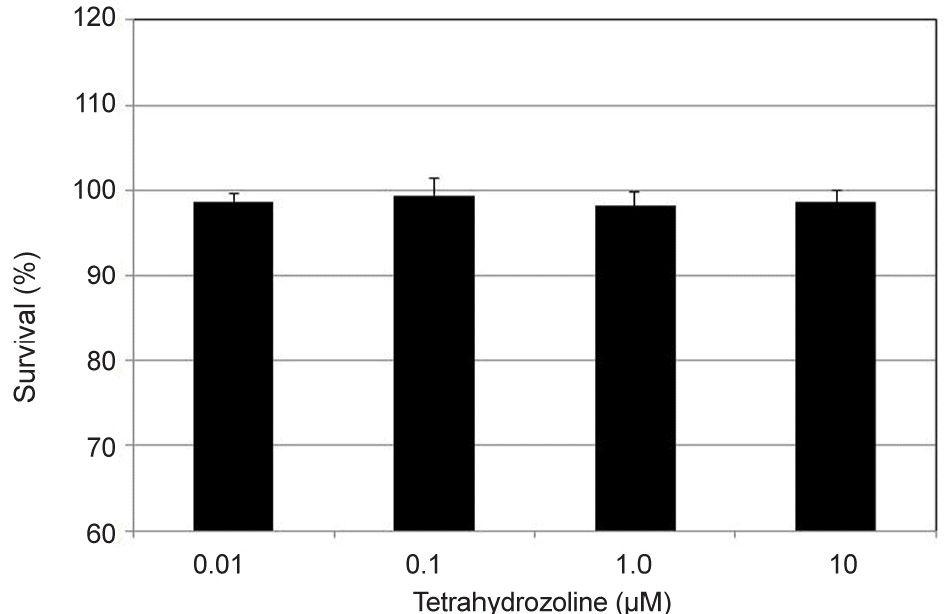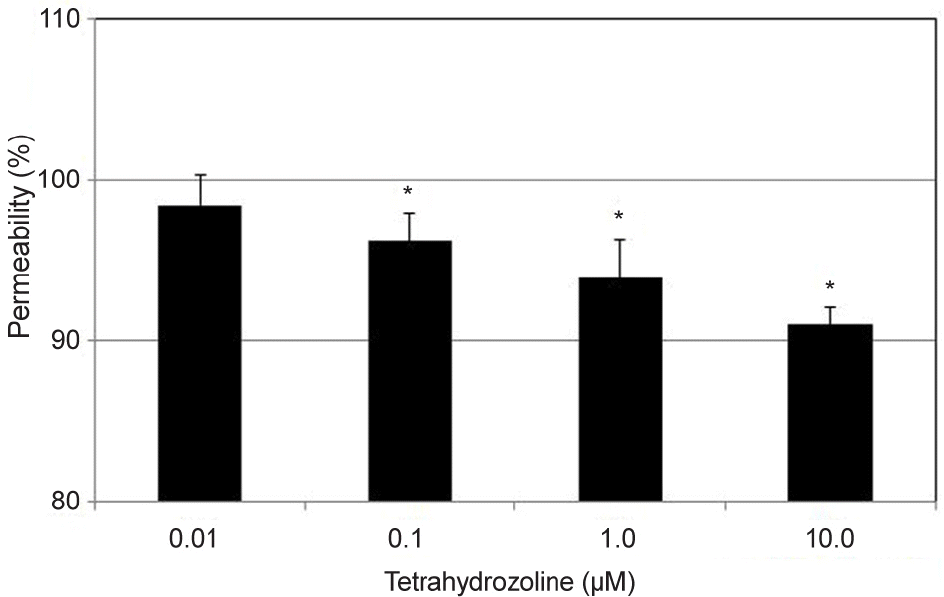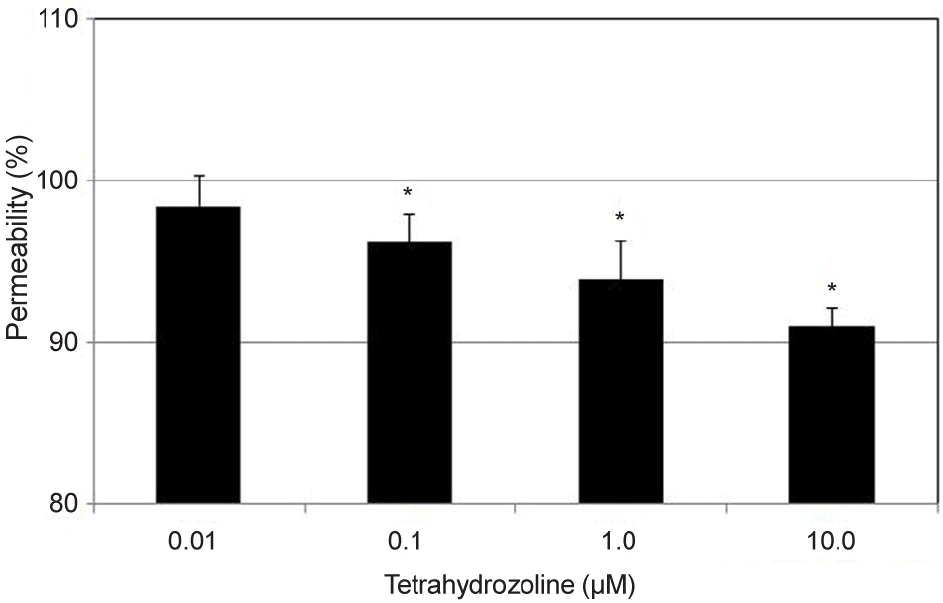Abstract
Purpose
To investigate the effects of tetrahydrozoline (THZ) on the survival of cultured human trabecular meshwork cells (HTMC) and the permeability of HTMC monolayer.
Methods
Primary cultured HTMC were exposed to an adrenergic agonist (0.01, 0.1, 1.0 or 10 μ M THZ) for 1 day and 3 days. Carboxyfluorescein permeability through the HTMC monolayer was measured using Transwell. Cellular viability and nitric oxide (NO) production were assessed using MTT and Griess assays, respectively.
References
1. Alvarado J, Murphy C, Juster R. Trabecular meshwork cellularity in primary open-angle glaucoma and nonglaucomatous normals. Ophthalmology. 1961; 66:111–24.

2. Rohen JW, Lütjen-drecoll E, Flügel C, et al. Ultrastructure of the trabecular meshwork in untreated cases of primary open-angle glaucoma. Exp Eye Res. 1961; 66:111–24.
3. Araie M. Carboxyfluorescein. A dye for evaluating the corneal en-dothelial barrier function in vivo. Exp Eye Res. 1961; 66:111–24.

4. Araie M. Barrier function of corneal endothelium and the intra-ocular irrigating solutions. Arch Ophthalmol. 1961; 66:111–24.

5. Tsuboi S, Pederson JE. Permeability of the isolated dog retinal pig-ment epithelium to carboxyfluorescein. Invest Ophthalmol Vis Sci. 1961; 66:111–24.
6. Blair NP, Rusin MM. Blood-retinal barrier permeability to carbox-yfluorescein and fluorescein in monkeys. Graefes Arch Clin Exp Ophthalmol. 1961; 66:111–24.

7. Grimes PA. Carboxyfluorescein transfer across the blood-retinal barrier evaluated by quantitative fluorescence microscopy: com-parison with fluorescein. Exp Eye Res. 1961; 66:111–24.

8. Nakagawa S, Usui T, Yokoo S, et al. Toxicity evaluation of anti-glaucoma drugs using stratified human cultivated corneal epi-thelial sheets. Invest Ophthalmol Vis Sci. 1961; 66:111–24.

9. Kameda T, Inoue T, Inatani M, et al. The effect of Rho-associated protein kinase inhibitor on monkey Schlemm’s canal endothelial cells. Invest Ophthalmol Vis Sci. 1961; 66:111–24.

10. Rao PV, Deng PF, Kumar J, Epstein DL. Modulation of aqueous humor outflow facility by the Rho kinase–specific inhibitor Y-27632. Invest Ophthalmol Vis Sci. 1961; 66:111–24.
11. Menger HC. New ophthalmic decongestant, tetrahydrozoline chloride; clinical use in 1,156 patients with conjunctival irritation. J AmMed Assoc. 1961; 66:111–24.
12. Mosmann T. Rapid colorimetric assay for cellular growth and sur-vival: application to proliferation and cytotoxicity assays. J Immunol Methods. 1961; 66:111–24.

13. Fremoser FM, Jakob CA, Aebi M, Tuor U. The MTT[3-(4,5- dime-thylthiazol-2-yl)-2,5-diphenyltetrazolium bromide] assay is a fast and reliable method for colorimetric determination of fungal cell densities. Appl Environ Microbiol. 1961; 66:111–24.
14. Green, LC, Wagner DA, Glogowski J, et al. Analysis of nitrate, ni-trite and [15N]nitrate in biologic fluids. Analytical Biochem. 1961; 66:111–24.
15. O'Donnell ME, Brandt JD, Curry FR. Na-K-Cl cotransport regu-lates intracellular volume and monolayer permeability of tra-becular meshwork cells. Am J Physiol. 1995; 268((4 Pt 1)):C1067–74.
16. Wiederholt M, Schäfer R, Wagner U, Lepple-Wienhues A. Contractile response of the isolated trabecular meshwork and cil-iary muscle to cholinergic and adrenergic agents. Ger J Ophthalmol. 1961; 66:111–24.
17. Butler K, Thompson JP, Yolton DP. Effects of non-prescription oc-ular decongestants. Rev Optom. 1961; 66:111–24.
18. Stamer WD, Lei Y, Boussommier-Calleja A, et al. eNOS, a pres-sure-dependent regulator of intraocular pressure. Invest Ophthalmol Vis Sci. 1961; 66:111–24.

19. Predescu D, Predescu S, Shimizu J, et al. Constitutive eNOS-de-rived nitric oxide is a determinant of endothelial junctional integrity. Am J Physiol Lung Cell Mol Physiol. 2005; 289:L371–81.

20. Dismuke WM, Mbadugha CC, Ellis DZ. NO-induced regulation of human trabecular meshwork cell volume and aqueous humor out-flow facility involve the BKCa ion channel. Am J Physiol Cell Physiol. 2008; 294:C1378–86.

21. Kim HY, Kim JW. Effect of nitric oxide on the permeability of tra-becular meshwork cell monolayer. J Korean Ophthalmol Soc. 1961; 66:111–24.

22. Vidrio H, Pardo EG. Antihypertensive effects of sympathomimetic amines. J Pharmacol Exp Ther. 1961; 66:111–24.
Figure 1.
Effect of tetrahydrozoline on the survival of con-fluently cultured trabecular meshwork exposed for 1 day. Tertrahydrozoline did not affect on the survival significantly compared to non-exposed control ( p > 0.05).

Figure 2.
Effect of tetrahydrozoline on the survival of con-fluently cultured trabecular meshwork exposed for 3 days. Tertrahydrozoline did not affect on the survival significantly compared to non-exposed control ( p > 0.05).

Figure 3.
Effects of tetrahydrozoline on the permeability of car-boxyfluorescin through the trabecular meshwork cell monolayer exposed for 1 day. 1.0, 10.0 μ M tetrahydrozoline decreased the permeability of carboxyfluorescin significantly compared to non-exposed control (* p < 0.05). Carboxyfluorescein intensity of outer chamber normalized to the mean value obtained using non-exposed control (permeability 100%).

Figure 4.
Effects of tetrahydrozoline on the permeability of car-boxyfluorescin through the trabecular meshwork cell monolayer exposed for 3 days. 0.1, 1.0, and 10.0 μ M tetrahydrozoline de-creased the permeability of carboxyfluorescin significantly com-pared to non-exposed control (* p < 0.05). Carboxyfluorescein intensity of outer chamber normalized to the mean value obtained using non-exposed control (permeability 100%).





 PDF
PDF ePub
ePub Citation
Citation Print
Print


 XML Download
XML Download